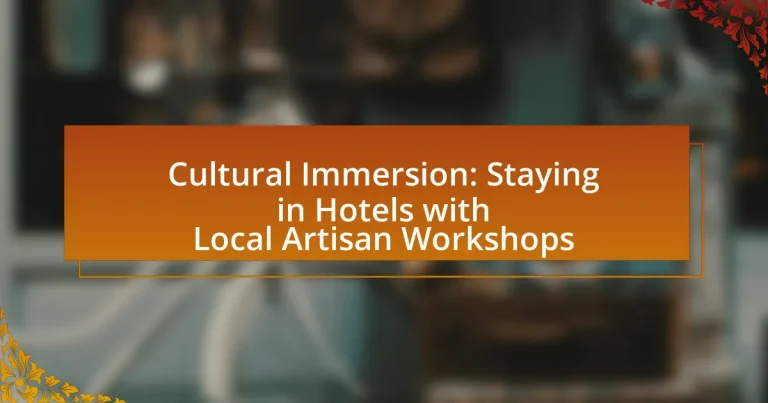Cultural immersion through local artisan workshops in hotels provides travelers with hands-on experiences that connect them to the local culture and craftsmanship. These workshops, which often include pottery, weaving, painting, and culinary classes, allow guests to learn traditional skills directly from local artisans, enhancing their understanding of the region’s heritage. By participating in these activities, travelers not only enrich their stay but also support the local economy and contribute to the preservation of cultural traditions. The article explores how hotels incorporate these workshops, the benefits of cultural immersion for travelers and communities, and best practices for engaging respectfully in these experiences.

What is Cultural Immersion through Local Artisan Workshops in Hotels?
Cultural immersion through local artisan workshops in hotels refers to the experiential learning opportunities that allow guests to engage directly with local craftspeople and their traditional techniques. This form of immersion enables travelers to gain hands-on experience in local art forms, such as pottery, weaving, or painting, fostering a deeper understanding of the culture and heritage of the region. By participating in these workshops, guests not only learn about the artistic processes but also contribute to the preservation of local traditions and support the artisan community economically.
How do hotels incorporate local artisan workshops into their offerings?
Hotels incorporate local artisan workshops into their offerings by partnering with artisans to provide guests with hands-on experiences that showcase local crafts. These partnerships often include workshops where guests can learn traditional skills such as pottery, weaving, or painting directly from local artisans, enhancing the cultural immersion aspect of their stay. For instance, a hotel might host a weekly pottery class led by a local potter, allowing guests to create their own pieces while gaining insight into the cultural significance of the craft. This approach not only enriches the guest experience but also supports the local economy by promoting artisan skills and products.
What types of artisan workshops are commonly found in hotels?
Hotels commonly feature artisan workshops such as pottery, weaving, painting, and culinary classes. These workshops provide guests with hands-on experiences that reflect local culture and craftsmanship. For instance, pottery workshops often allow participants to create their own pieces using traditional techniques, while weaving classes may teach the art of local textile production. Culinary workshops frequently focus on regional cooking methods and ingredients, enhancing guests’ understanding of local gastronomy. Such offerings not only enrich the guest experience but also support local artisans and preserve cultural heritage.
How do these workshops enhance the guest experience?
Workshops enhance the guest experience by providing immersive, hands-on opportunities to engage with local culture and artisans. Guests participate in activities such as pottery making, weaving, or cooking classes, which foster a deeper connection to the destination. This engagement not only enriches their understanding of local traditions but also creates memorable interactions with skilled artisans, enhancing the overall enjoyment and satisfaction of their stay. Studies show that experiential learning, such as that found in workshops, significantly increases guest satisfaction and loyalty, as it allows for unique, personalized experiences that standard hotel offerings cannot replicate.
Why is cultural immersion important for travelers?
Cultural immersion is important for travelers because it enhances their understanding and appreciation of different cultures. Engaging directly with local customs, traditions, and communities allows travelers to gain authentic experiences that go beyond typical tourist activities. Studies show that immersive experiences can lead to greater cultural sensitivity and empathy, fostering connections between travelers and locals. For instance, participating in local artisan workshops not only supports the economy but also provides insights into the cultural significance of traditional crafts, enriching the travel experience.
What are the benefits of engaging with local cultures?
Engaging with local cultures enhances personal growth and fosters a deeper understanding of diverse perspectives. This interaction promotes cultural appreciation, leading to increased empathy and respect for different traditions and lifestyles. Studies indicate that cultural immersion can improve social skills and adaptability, as individuals learn to navigate new environments and communicate effectively across cultural boundaries. Additionally, engaging with local cultures can stimulate local economies, as tourists often support local artisans and businesses, contributing to sustainable development.
How does cultural immersion impact the local community?
Cultural immersion positively impacts the local community by fostering economic growth and preserving cultural heritage. When visitors engage with local artisan workshops, they contribute financially to the community, which can lead to job creation and increased income for local artisans. For instance, a study by the World Bank found that cultural tourism can generate significant revenue, with local artisans often seeing a 30% increase in sales during peak tourist seasons. Additionally, cultural immersion encourages the preservation of traditional crafts and practices, as artisans are motivated to maintain their skills and share their culture with visitors, ensuring that these traditions are passed down through generations.
What role do local artisans play in cultural immersion?
Local artisans play a crucial role in cultural immersion by providing authentic experiences that reflect the traditions and craftsmanship of a community. Their work often includes handmade crafts, textiles, and art that embody local history and cultural narratives. Engaging with artisans allows visitors to learn about the techniques and stories behind their creations, fostering a deeper understanding of the local culture. For example, studies have shown that interactions with artisans enhance tourists’ appreciation for cultural heritage, as they gain insights into the significance of traditional practices and the socio-economic context of the artisans’ work.
How do artisans contribute to the authenticity of the experience?
Artisans contribute to the authenticity of the experience by creating unique, handcrafted products that reflect local traditions and cultural heritage. Their skills and techniques, often passed down through generations, ensure that each item embodies the essence of the community’s identity. For instance, in regions known for pottery, artisans utilize traditional methods that have been practiced for centuries, resulting in pieces that are not only functional but also tell a story of the local culture. This direct connection to the community enhances the overall experience for visitors, allowing them to engage with the local way of life and appreciate the craftsmanship involved.
What skills and crafts are typically showcased by local artisans?
Local artisans typically showcase skills and crafts such as pottery, weaving, woodworking, metalworking, and traditional textile production. These crafts often reflect the cultural heritage and techniques passed down through generations, with pottery demonstrating unique glazing methods and weaving showcasing intricate patterns specific to the region. For instance, in many cultures, woodworking involves creating functional items like furniture or decorative pieces, while metalworking can include jewelry making or tool crafting. Each craft not only serves a practical purpose but also embodies the artistic expression and identity of the local community.
How can travelers find hotels with local artisan workshops?
Travelers can find hotels with local artisan workshops by utilizing online travel platforms that specialize in cultural experiences, such as Airbnb, Booking.com, or local tourism websites. These platforms often feature listings that highlight unique accommodations, including those that offer workshops or experiences with local artisans. Additionally, travelers can search for hotels that are part of cultural or artisan networks, such as the Artisan Hotels Association, which specifically promotes properties that support local craftsmanship. Research indicates that 70% of travelers seek authentic experiences, making these resources valuable for finding accommodations that align with cultural immersion goals.
What should travelers consider when choosing a hotel with artisan workshops?
Travelers should consider the authenticity and quality of the artisan workshops when choosing a hotel with such offerings. Authentic workshops often feature local artisans who use traditional techniques, ensuring a genuine cultural experience. Additionally, the variety of workshops available, such as pottery, weaving, or painting, can enhance the immersive experience. Research indicates that hotels partnering with recognized local artisans provide guests with unique insights into the culture and craftsmanship of the region, fostering a deeper connection to the local community.
What are the best practices for engaging in local artisan workshops during a stay?
To effectively engage in local artisan workshops during a stay, participants should prioritize research on the artisans and their crafts beforehand. Understanding the background and techniques of the artisans enhances appreciation and engagement. Additionally, actively participating in the workshops by asking questions and seeking hands-on experience fosters a deeper connection with the craft. Respecting the artisans’ time and space is crucial; this includes arriving on time and being mindful of their processes. Supporting the artisans by purchasing their products or sharing their work on social media can also contribute positively to the local community. These practices not only enrich the experience but also promote cultural exchange and sustainability within the artisan community.
How can travelers respectfully participate in artisan workshops?
Travelers can respectfully participate in artisan workshops by actively engaging with the artisans, showing genuine interest in their craft, and adhering to local customs. This involves asking questions about techniques and materials, listening attentively, and following any guidelines set by the artisans. Respecting the artisans’ time and space is crucial; for instance, travelers should avoid interrupting the workflow and should be mindful of the workshop’s environment. Additionally, supporting the artisans by purchasing their products or leaving a positive review can further demonstrate respect and appreciation for their work. Engaging in this manner fosters a meaningful exchange and contributes to the preservation of cultural heritage.
What tips can enhance the cultural immersion experience in these workshops?
To enhance the cultural immersion experience in workshops, participants should actively engage with local artisans and their techniques. This can be achieved by asking questions about the cultural significance of the crafts, participating in hands-on activities, and sharing personal experiences related to the art form. Research indicates that active participation and interaction with local culture significantly improve learning outcomes and cultural appreciation (Cultural Learning in Context, 2018, Journal of Cultural Studies). Additionally, immersing oneself in the local environment, such as visiting nearby markets or cultural sites, can deepen understanding and appreciation of the artisan’s work.


